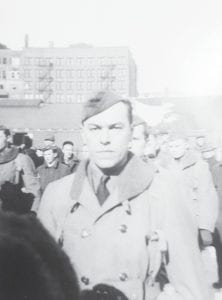Willard Nelson was born on November 11, 1914, the first child of Carl and Phoebe Nelson of Lutsen. He grew up on the family homestead, which still stands at the foot of the Caribou Trail in Lutsen.
Growing up in Lutsen, Willard wanted something more. He didn’t like school much and he grew tired of rural life—milking cows, working at the family resort and taking guests fishing. When he was 18, he talked his family into letting him move to the Twin Cities where he found despite only finishing 8th grade in school, he found work with the Brown & Bigelow Advertising Company. And it was there he learned something that would help him his entire life, including in his military career.
He worked his way up through the company from the mailroom to a sales position and he was assigned a tough service territory in Iowa.
After a particularly tough sales call, he decided he was not going to just take “no” for an answer. He knocked on the door again and asked the customer what he could have done differently. Surprisingly, the question resulted in an order and Willard learned then and there that he should always give whatever he was doing another shot. He decided to never give up.
Willard could see that war was approaching and at 22 years old he decided to join the National Guard unit based in Duluth, the 34th Infantry Division. On February 10, 1941, he was sent to Camp Claiborne, in Rapides Parish, Louisiana, one of 600 soldiers from northern Minnesota. He and his comrades describe Camp Claiborne as a muddy, awful, place.
Willard made it through basic training and decided to come home to Minnesota on leave. He hitchhiked his way north, all the way from Louisiana to Lutsen. Along the way, he was picked up by a fellow in a pickup truck and he rode in the bed of the truck in the rain. The driver stopped for gas and Willard waited in the rain. And waited…and waited… and waited.
Finally, Willard decided to see what was going on. He entered the tiny gas station to find a group huddled around the radio—the date was December 7, 1941— Pearl Harbor had just been attacked.
By the time Willard made it back to his unit it had become part of the 125th Field Artillery and the majority of soldiers had been deployed. And his commander decided that he should be sent to officer candidate school (OCS).
Willard argued that he didn’t have the qualifications, but his supervisors pointed to a business class he had taken at the University of Minnesota while at Brown & Bigelow. You’ve been to college, they told him— you’re qualified.
Willard was sent to officer training at Camp Carson, Colorado, where he “white-knuckled” it through the classes, never giving up, and ultimately obtaining the rank of 1st lieutenant. He was sent to a variety of schools, including to Goodyear Rubber & Tire for training on tank tracks. He was never sent overseas, but the Army kept him busy training others in the United States.
He was eventually assigned to Camp Hood in Waco, Texas where he worked as an instructor. His goal was to obtain the rank of captain, which he did just one month before he was honorably discharged on September 1, 1945.
Willard went on to work in a variety of careers, as a sales rep for Standard Oil, for Pontiac/GM, for Studebaker/Packard and eventually for Fiat Motors.
He never forgot his many friends from basic training, those who had been deployed and some who never made it home. The 125th suffered horrible casualties, with 3,737 men killed in action.
Willard recently attended a gathering at the Pickwick Restaurant in Duluth, where he was reunited with an old tent mate, a man named Bob Watts, who at 16-years-old lied to enter military service. Willard said he felt a little out of place because he felt his friends were the “heroes.” He said they were the ones who faced danger overseas.
But Bob Watts, “the kid,” he knew long ago said that was not the case. Watts credited Willard with getting him through basic training with his “never give up” spirit.



Leave a Reply